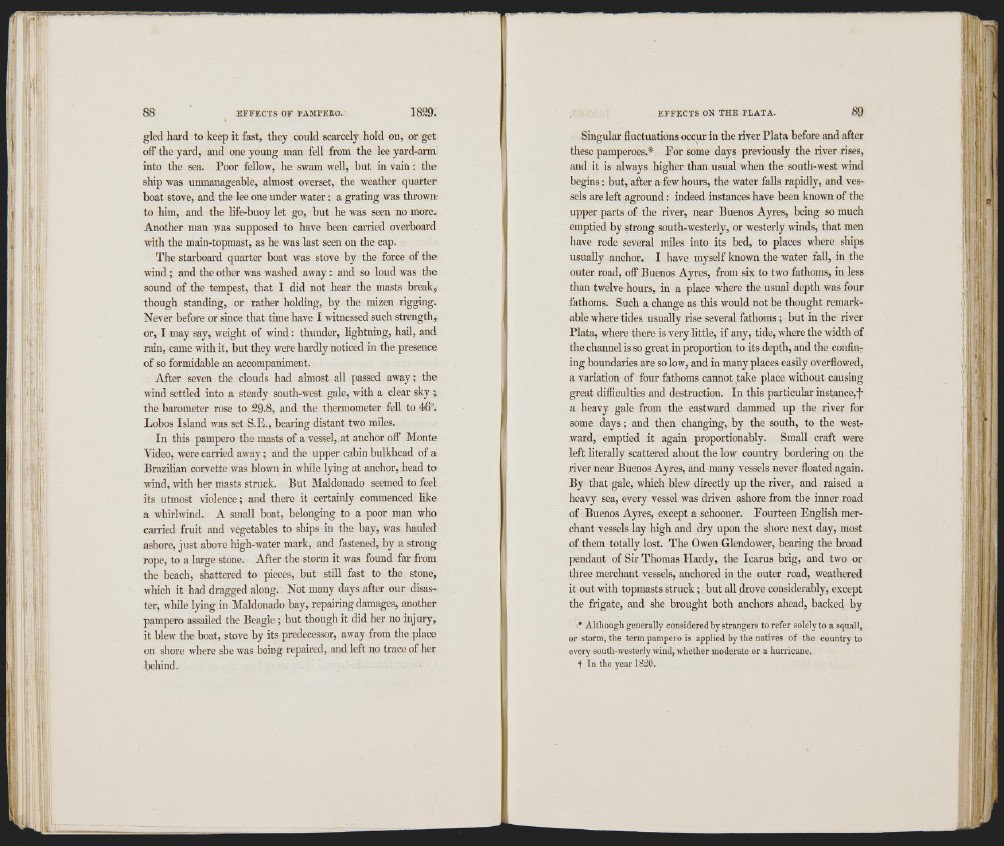
H '
A
7:
:-Ì7!
1";
;
Ì ’
,i.
7'
;! S „
••' L,
!-v;i' .
I h:
88 EF FEC T S OF PAMPERO. 1829.
gled hard to keep it fast, they could scarcely hold on, or get
off the yard, and one young man fell from the lee yard-arm
into the sea. Poor fellow, he swam well, but in vain : the
ship was unmanageable, almost overset, the weather quarter
boat stove, and the lee one under water : a grating was thrown-
to him, and the life-buoy let go, but he was seen no more.
Another man was supposed to have been carried overboard
with the main-topmast, as he was last seen on the cap.
The starboard quarter boat was stove by the force of the
wind ; and the other was washed away ; and so loud was the
sound of the tempest, that I did not hear the masts break,
though standing, or rather holding, by the mizen rigging.
Never before or since that time have I witnessed such strength,
or, I may say, weight of wind : thunder, lightning, hail, and
rain, came with it, but they were hardly noticed in the presence
of so formidable an accompaniment.
After seven the clouds had almost all passed away ; the
wind settled into a steady south-west gale, with a clear sky ;
the barometer rose to 29.8, and the thermometer fell to 46°.
Lobos Island was set S.E., bearing distant two miles.
In this pampero the masts of a vessel, at anchor off Monte
Video, were carried away ; and the upper cabin bulkhead of a
Brazilian corvette was blown in while lying at anchor, head to
wind, with her masts struck. But Maldonado seemed to feel
its utmost violence; and there it certainly commenced like
a whirlwind. A small boat, belonging to a poor man who
carried fruit and vegetables to ships in the bay, was hauled
ashore, just above high-water mark, and fastened, by a strong
rope, to a large stone. After the storm it was found far from
the beach, shattered to pieces, but still fast to the stone,
which it had dragged along. Not many days after our disaster,
while lying in Maldonado bay, repairing damages, another
pampero assailed the Beagle ; hut though it did her no injury,
it blew the boat, stove by its predecessor, away from the place
on shore where she was boing repaired, and left no trace of her
behind.
■7::
' ml
E F FEC T S ON TH E PLATA.
I d .
Singular fluctuations occur in the river Plata before and after
these pamperoes.* For some days previously the river rises,
and it is always higher than usual when the south-west wind
begins: but, after a few hours, the water falls rapidly, and vessels
are left aground : indeed instances have been known of the
upper parts of the river, near Buenos Ayres, being so much
emptied by strong south-westerly, or westerly winds, that men
have rode several miles into its bed, to places where ships
usually anchor. I have myself known the water fall, in the
outer road, off Buenos Ayres, from six to two fathoms, in less
than twelve hours, in a place where the usual depth was four
fathoms. Such a change as this would not be thought remarkable
where tides usually rise several fathoms ; but in the river
Plata, where there is very little, if any, tide, where the width of
the channel is so great in proportion to its depth, and the confining
boundaries are so low, and in many places easily overflowed,
a variation of four fathoms cannot take place without causing
great diificulties and destruction. In this particular instance,!
a heavy gale from the eastward dammed up the river for
some days; and then changing, by the south, to the westward,
emptied it again proportionably. Small craft were
left literally scattered about the low country bordering on the
river near Buenos Ayres, and many vessels never floated again.
By that gale, which blew directly up the river, and raised a
heavy sea, every vessel was driven ashore from the inner road
of Buenos Ayres, except a schooner. Fourteen English merchant
vessels lay high and dry upon the shore next day, most
of them totally lost. The Owen Glendower, bearing the broad
pendant of Sir Thomas Hardy, the Icarus brig, and two or
three merchant vessels, anchored in the outer road, weathered
it out with topmasts struck ; but all drove considerably, except
the frigate, and she brought both anchors aliead, backed by
r* Although generally considered by strangers to refer solely to a squall,
or storm, the term pampero is applied by the natives of the country to
every south-westerly wind, whether moderate or a hurricane.
t In the year 1820.
li'
ill ■’
#t:i7
7 7 ;
il'è